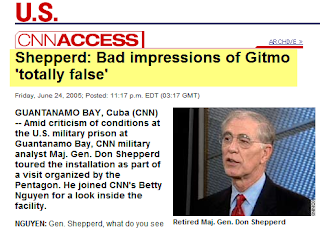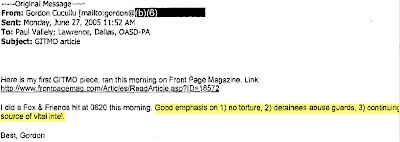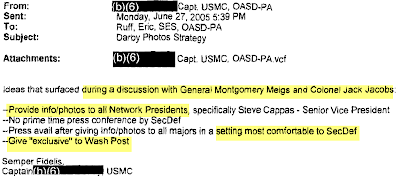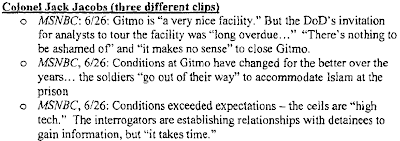The Pentagon has posted to its website the roughly 8,000 pages and audio tapes it was forced to provide to the New York Times regarding its "military analyst" program. Anyone who reads through them, as I've now done, can only be left with one conclusion (other than being extremely impressed with David Barstow's work in putting together this story): if this wasn't an example of an illegal, systematic "domestic propaganda campaign" by the Pentagon, then nothing is.
Despite this, the truly extraordinary blackout by the major television and cable news networks -- which were complicit in this program -- continues. Howard Kurtz of CNN and The Washington Post previously called this blackout "pathetic", and yesterday, The Politico published a relatively impressive article further documenting the "deafening silence" from the networks at the center of this story. As the article noted:
While bloggers have kept the story simmering, Democratic congressional leaders also are speaking out, calling for investigations that could provoke the networks to finally cover the Times story — and, in effect, themselves.
Beyond the networks' keeping this scandal completely concealed from their viewers, The Politico story noted that only two network executives -- CNN's President Jim Walton and ABC's President David Westin (.pdf) -- even bothered to respond to the letters sent by Rep. Rosa DeLauro to all networks demanding answers with regard to their complicity in this program. When responding, the two executives -- exactly as Brian Williams was when he was finally forced by blog-inspired commenters to respond (on his blog, but not on NBC) -- were casually dismissive of the entire matter, insisting that they had done nothing wrong (other than CNN's acknowledgment that they failed to detect a conflict of interest with regard to a single military analyst they had used).
Let's just lay out some of the relevant facts about what happened -- looking at one episode illustrating how this entire program worked and what CNN specifically did. Then, we can see whether CNN served as an eager instrument for a corrupt domestic propaganda campaign by the Pentagon, or whether, as Walton claims, CNN acted with perfect propriety. Tomorrow, we'll do the same with regard to ABC.
* * * * *
In June of 2005, communications officials in the Pentagon began planning a military-sponsored trip to Guantanamo for selected retired military officers who were currently working as "news analysts" for various television networks and magazines. Amnesty International had just issued its most scathing report yet about Gitmo, as part of its 2005 report on America's "new gulag of prisons around the world beyond the reach of the law and decency." It specifically called Gitmo "the gulag of our times," and detailed years of extreme abuses that had taken place there.
To counter Amnesty's findings, the Pentagon planned the Gitmo trip over the course of two weeks in mid-June. They eventually confirmed June 24 as the date for the tour, with a list of ten participants, including retired Gen. Don Shepperd of CNN, along with various "military analysts" from MSNBC and Fox.
From the beginning, the whole trip was transparently propagandistic, and there was no possibility that the participants could learn anything meaningful about Gitmo. It was a one-day itinerary (pp. 7476-7477). They left Andrews Air Force Base at 6:45 a.m. on June 24, and did not land in Cuba until 10:00 a.m. Virtually the entire 3 hour plane ride was filled with "briefings" by various DoD officials, and after they landed -- and before they were taken to the detention camps -- they were given another 90 minutes of briefings.
They did not even arrive at Camp Delta -- where the detainees are kept -- until 12:35 p.m. that afternoon. After a 50-minute lunch with the troops, they began a guided tour of Camp Delta at 1:20 p.m. which lasted a grand total of one hour and 25 minutes. Packed into that 85-minute tour was a viewing of an interrogation, a tour of an "unoccupied cellblock," and a visit to the detention hospital. That was all the time they spent touring Camp Delta: 85 minutes.
Then, at 2:45 p.m., they were brought to Camp V for 10 minutes, followed by a tour of Camp X-Ray for 35 minutes. Then they left Cuba -- to fly home, with the "wheels up" on their plane at exactly 4:30 p.m. the same day, arriving back at Andrews that night at 7:45 p.m. They were then brought back to the Pentagon at 8:00 p.m. They spent a grand total of 3 hours and 55 minutes at the Guantanamo detention facilities, with almost one hour of that devoted to lunch with the troops. That was the sum total of their grand tour of the detention facility: less than 3 hours. And then the propaganda campaign to malign and dispute the extensive, amply documented findings of Amnesty was unleashed in full.
* * * * *
In a "trip report" he filed with his Pentagon handlers, CNN's Gen. Shepperd explicitly acknowledged both the blatantly propagandistic purpose of the trip, as well as the extremely limited and controlled scope of information to which he had access in a single-day trip (7434). Shepperd stated: "Did we drink the 'Government Kool-Aid?' -- of course, and that was the purpose of the trip." In his Pentagon report, Shepperd added the obvious: that "a one day visit does not an expert make," that "the government was obviously going to put its best foot forward to get out its message," and that "former military visitors are more likely to agree with government views than a more appropriately skeptical press."
"Did we drink the 'Government Kool-Aid?' -- of course, and that was the purpose of the trip." In his Pentagon report, Shepperd added the obvious: that "a one day visit does not an expert make," that "the government was obviously going to put its best foot forward to get out its message," and that "former military visitors are more likely to agree with government views than a more appropriately skeptical press."
Shepperd's statement as to the purpose of the GITMO trip -- to have the pro-government analysts "drink the government Kool-Aid" -- was unquestionably accurate, as multiple Pentagon documents reflect. As but one example, a planning email from Pentagon official Dallas Lawrence, dated June 21, 2005, highlighted the importance of scheduling the Gitmo trip to ensure that The American Spectator's Jed Babbin could participate, noting (7486):
He is hosting a number of radio shows this summer. I would have to think he would have every member of Congress on to talk about their trip together -- a definite plus for us looking to expand the echo chamber.
Shepperd, despite being employed by CNN as an "analyst," clearly had as his first priority ensuring the success of the Pentagon's messaging mission. Upon returning from the Gitmo trip, Shepperd, on June 25, sent an email to Pentagon officials praising the Gitmo tour and telling them: "let me know if I can help you." He signed the email: "Don Shepperd (CNN military analyst)" (7470): Demonstrating how controlled by the Pentagon were these "analysts," Shepperd's email to "help" was forwarded to top Rumsfeld aide Larry Di Rita, who replied (7470): "OK, but let's get him briefed on Khatani so he doesn't go too far on that one" -- referring to the so-called 20th hijacker Mohammed al-Khatani, whose Guantanamo interrogation had been particularly brutal, as he "was stripped naked, isolated, given intravenous fluids and forced to urinate on himself, and exercised to exhaustion during interrogations that lasted 18 to 20 hours a day for 48 of 54 days."
Demonstrating how controlled by the Pentagon were these "analysts," Shepperd's email to "help" was forwarded to top Rumsfeld aide Larry Di Rita, who replied (7470): "OK, but let's get him briefed on Khatani so he doesn't go too far on that one" -- referring to the so-called 20th hijacker Mohammed al-Khatani, whose Guantanamo interrogation had been particularly brutal, as he "was stripped naked, isolated, given intravenous fluids and forced to urinate on himself, and exercised to exhaustion during interrogations that lasted 18 to 20 hours a day for 48 of 54 days."
* * * * *
"Helping" the Pentagon is exactly what Shepperd, pretending to be an "independent analyst" on CNN, then proceeded to do. In numerous appearances on CNN talking about Gitmo, no mention was ever made of Khatani or other specific, documented abuses. To the contrary, Shepperd's "analysis" -- broadcast all over CNN -- was exactly what it would have been had Rumsfeld himself written the script.
Shepperd -- after his half-day visit -- went on several CNN shows and opined emphatically about how great things were at Guantanamo and how reports from Amnesty were "totally false." On the day of the Guantanamo "tour" -- June 24, 2005 -- CNN's Betty Nguyen conducted a live telephone interview with Gen. Shepperd that went as follows:
NGUYEN: We have just established a line to Guantanamo Bay, to our military analyst General Don Shepperd. He arrived there as part of a trip put together by the Pentagon in wake of that human rights report that criticized conditions at the U.S. prison for war detainees. General Shepperd on the phone with us right now.
General Shepperd, what do you see so far while being there?
MAJ. GEN. DONALD SHEPPERD, CNN MILITARY ANALYST: Well, . . . I tell you, every American should have a chance to see what our group saw today. The impressions that you're getting from the media and from the various pronouncements being made by people who have not been here, in my opinion, are totally false.
What we're seeing is a modern prison system of dedicated people, interrogators and analysts that know what they are doing. And people being very, very well-treated. We've had a chance to tour the facility, to talk to the guards, to talk to the interrogators and analysts. We've had a chance to eat what the prisoners eat. We've seen people being interrogated. And it's nothing like the impression that we're getting from the media. People need to see this, Betty. . . .
I have been in prisons and I have been in jails in the United States, and this is by far the most professionally-run and dedicated force I've ever seen in any correctional institution anywhere.
Here's what Shepperd reported about the hand-picked interrogation he watched:
NGUYEN: Let's back up for just a moment, because you said you said watched an interrogation.SHEPPERD: Yes.
NGUYEN: Kind of explain to us how that played out. And were there any instances of abuse or possible abuse?
SHEPPERD: Absolutely not. These -- when I sat and watched them, I want to be very careful in describing them. And I don't want to describe how we watched or anything of that sort. But basically, you're able to observe interrogations. They have various ways of monitoring the interrogations and what have you and letting you see what's going on. With the interrogations that we watched were interrogators, there were translators that translated for the detainee and there were also intelligence people in there.
And they're basically asking questions. They just ask the same questions over a long period of time. They get information about the person's family, where they're from, other people they knew. All the type of things that you would want in any kind of criminal investigation. And these were all very cordial, very professional. There was laughing in two of them that we...
NGUYEN: Laughing in an interrogation?
SHEPPERD: ... in the two of them that we watched. Yes, indeed. It's not -- it's not like the impression that you and I have of what goes on in an interrogation, where you bend people's arms and mistreat people. They're trying to establish a firm professional relationship where they have respect for each other and can talk to each other. And yes, there were laughing and humor going on in a couple of these things. And I'm talking about a remark made where someone will smirk or laugh or chuckle.
NGUYEN: All right. General Don Shepperd, we appreciate your time and that look inside Gitmo, with you being there on this tour. Thank you for that.
CNN then put a transcript of the interview on CNN.com with this headline:
On June 27, Gen. Shepperd appeared on CNN with Soledad O'Brien, who introduced him as a "CNN military analyst" just back from Gitmo. Shepperd "reported":
What we saw in Guantanamo bears no resemblance to what we are reading in the print press out there. Most of the people writing about this, I believe, have never been there.What I saw is we have -- we have impressions of an old facility, Camp X-ray, that was closed three years ago. What we have now is a modern, well-constructed prison, guarded by very, very dedicated people, doing an extremely tough job in the midst of very, very dangerous people, Soledad.
Shepperd then went on to claim that interrogators are still getting "valuable information" even from detainees held there for years. In fact, "we have really gotten a lot of information to prevent attacks in this country and in other countries with the information they're getting from these people. And it's still valuable."
Shepperd managed to reach all of these findings -- and to label Amnesty's findings "totally false" -- by virtue of a single, three-hour guided tour. Shepperd is the President of The Shepperd Group, which "provides expert guidance and consulting services to defense contractors." CNN's viewers were never told about that.
* * * * *
All television and print appearances of what the Pentagon called "our analysts" were meticulously tracked. Shepperd's live CNN call was particularly celebrated at the Pentagon, in an email entitled "Transcript of Don Shepperd's Remarks on CNN a little while ago" 7471): The Pentagon's analysts faithfully reported back to their handlers with pride about their success in getting booked on shows and being able to spout their talking points. From an email sent by one of the Gitmo trip participants, Gordon Cucullu, to top Pentagon aides (7444):
The Pentagon's analysts faithfully reported back to their handlers with pride about their success in getting booked on shows and being able to spout their talking points. From an email sent by one of the Gitmo trip participants, Gordon Cucullu, to top Pentagon aides (7444): ["I did a Fox & Friends hit at 0620 this morning. Good emphasis on 1) no torture, 2) detainees abuse guards, and 3) continuing source of vital intel"].
["I did a Fox & Friends hit at 0620 this morning. Good emphasis on 1) no torture, 2) detainees abuse guards, and 3) continuing source of vital intel"].
Those who served the Pentagon's messaging mission were rewarded. The American Spectator's Babbin emailed the Pentagon a column he had written defending Gitmo, lambasting "the outrageous lies of the Democrats," and attacking Dick Durbin, who had criticized Gitmo the prior week ("if you watch the video of Durbin's speech, you'll see . . . his face morphing into that of Jane Fonda's"). Babbin's email header about Durbin (7496): "The man disgusts me." The same day, Pentagon officials excitedly noted that "Bill O'Reilly read [Babbin's] GTMO article and wants Jed on the show Thursday." That prompted this email from top Rumsfeld communications aide Larry Di Rita (7495):
Conversely, those whose media commentary displeased the Pentagon had their access cut off. In May, 2006, Greg Kittfield wrote a cover story for National Journal featuring criticism by numerous retired generals of Rumsfeld's war management. In response, Pentagon official Bryan Whitman circulated an email which read: "Given this cover story by Kittfield, I don't think we need to find any time for Kittfield on the Secretary's calender."
The Pentagon comprehensively tracked every word uttered by their "surrogates," as their chosen messengers, back from Gitmo, spread out over MSNBC, CNN, ABC, Fox, and various newspapers and magazines -- all presented as independent analysts -- proclaiming Gitmo to be the very model of human rights and sterling respect for detainees. Here is the DOD's self-satisfied summary of the tidal wave of propaganda produced by its three-hour, staged tour (7416):


 Just to underscore how these retired military officers were anything but "independent news analysts," here is an email memorializing how two of them -- NBC's Montgomery Meigs and Jack Jacobs (the latter of whom was specifically praised by Brian Williams as an independent journalist) -- actually engaged in media strategy sessions with the Pentagon in order to maximize the efficacy of the Pentagon's Gitmo messaging program (7442):
Just to underscore how these retired military officers were anything but "independent news analysts," here is an email memorializing how two of them -- NBC's Montgomery Meigs and Jack Jacobs (the latter of whom was specifically praised by Brian Williams as an independent journalist) -- actually engaged in media strategy sessions with the Pentagon in order to maximize the efficacy of the Pentagon's Gitmo messaging program (7442): These same individuals, after planning media strategies with the Pentagon, were then repeatedly presented to MSNBC viewers as independent analysts to assess the Pentagon's conduct at Gitmo. From the Pentagon's tracking summary of Meigs' and Jacobs' post-trip media appearances:
These same individuals, after planning media strategies with the Pentagon, were then repeatedly presented to MSNBC viewers as independent analysts to assess the Pentagon's conduct at Gitmo. From the Pentagon's tracking summary of Meigs' and Jacobs' post-trip media appearances:

* * * * *
This Gitmo trip and the ensuing "analysis" was but one small -- though highly representative -- episode that was part of the Pentagon's five-year propaganda program aimed at shaping domestic opinion on the Iraq war, the "War on Terrorism" generally, and virtually every controversy relating in any way to the Pentagon. It is difficult to see how this could be anything but illegal [for an analysis of laws prohibiting covert domestic propaganda activities, see here, here, here, and here< (.pdf)].
But what is most extraordinary about all of this is that huge numbers of Americas who were subjected to this propaganda by their own Government still don't know that they were, because the television networks which broadcast it to them refuse to tell them about it, opting instead to suppress the story and stonewall any efforts to find out what happened. As corrupt as the Pentagon was here, our nation's major media outlets were at least just as bad. Their collective Pravda-like suppression now of the entire story -- behavior so blatantly corrupt that even the likes of Howie Kurtz and The Politico are strongly condemning them -- has become the most significant and revealing aspect of the entire scandal.



Shares